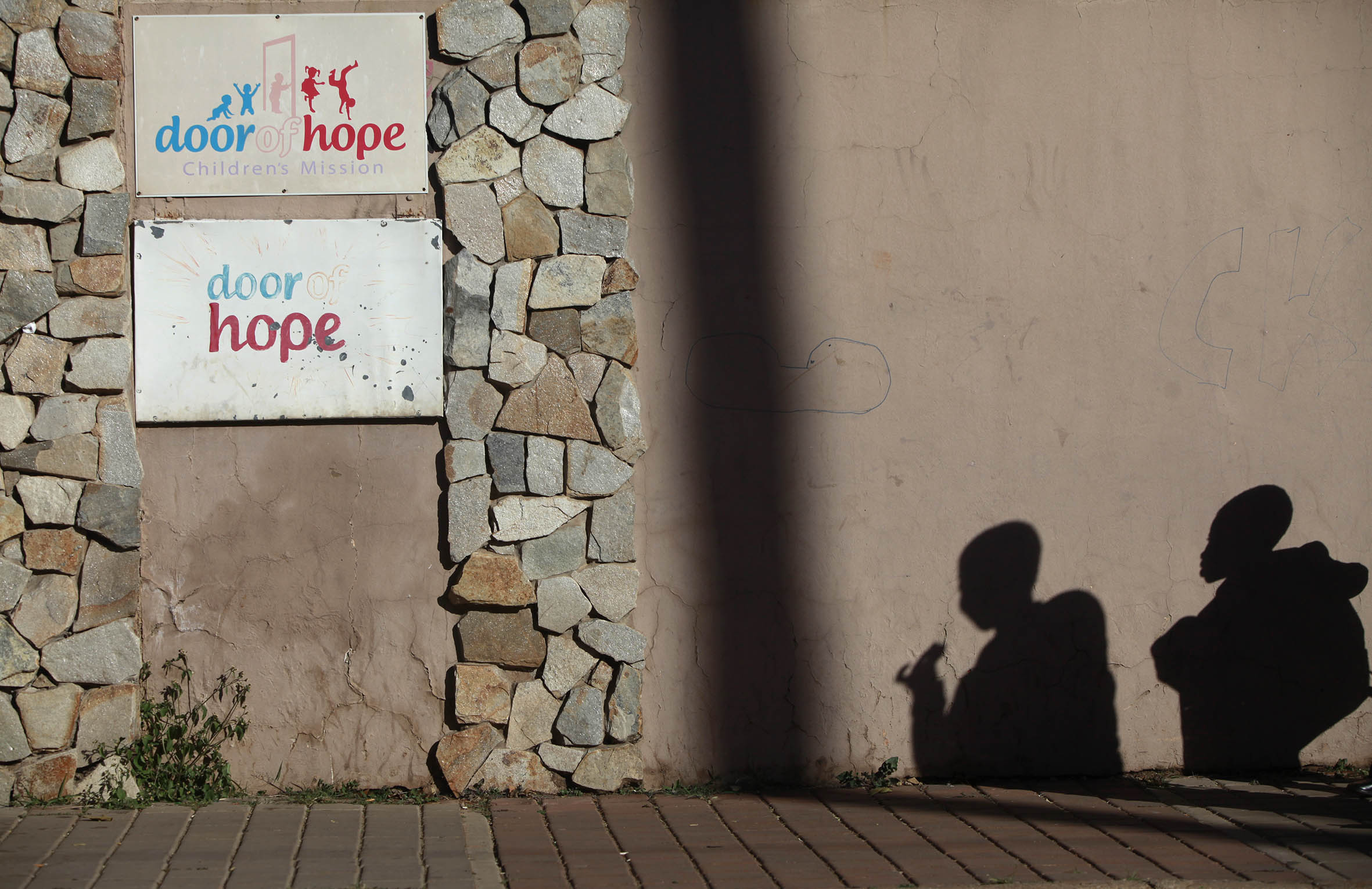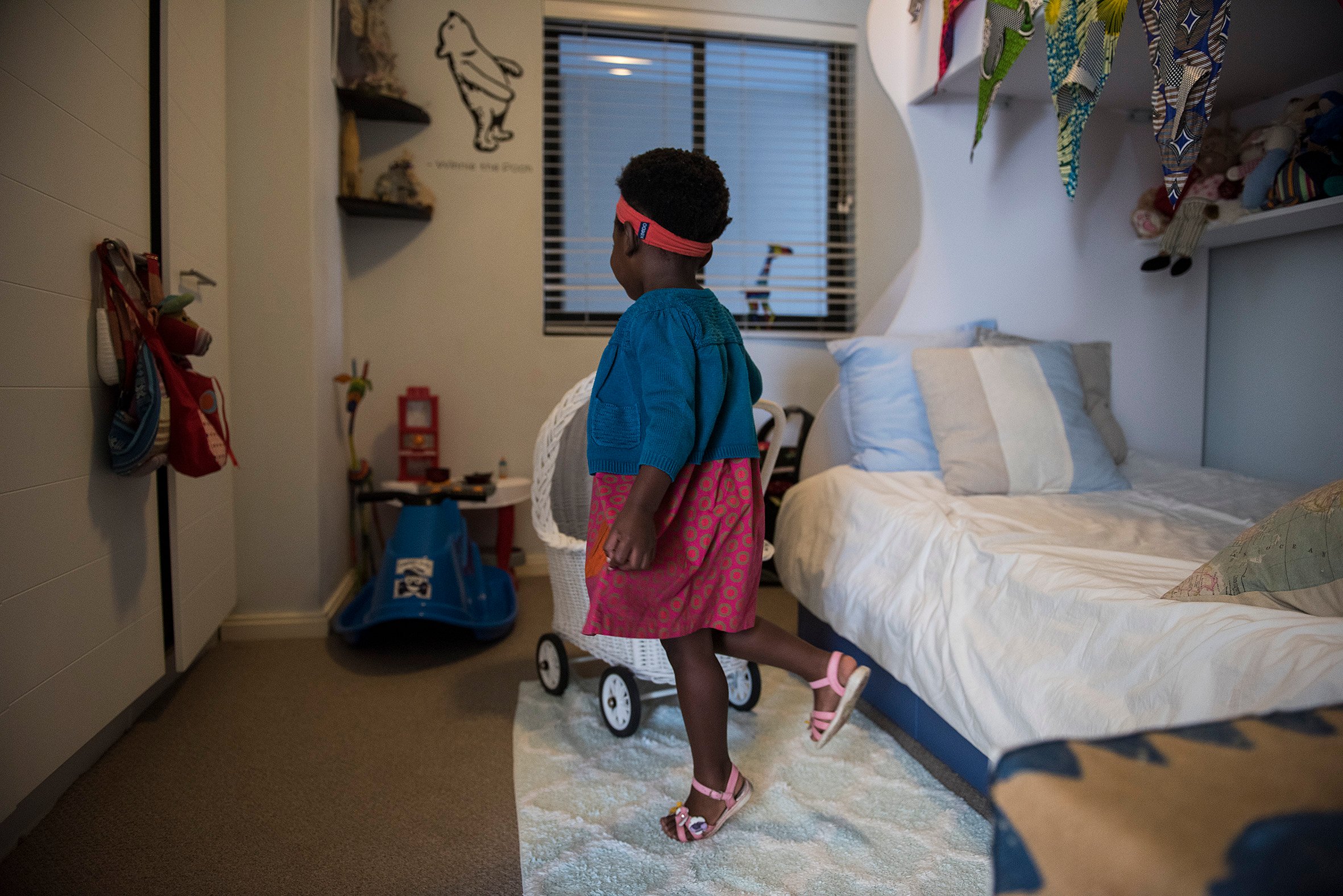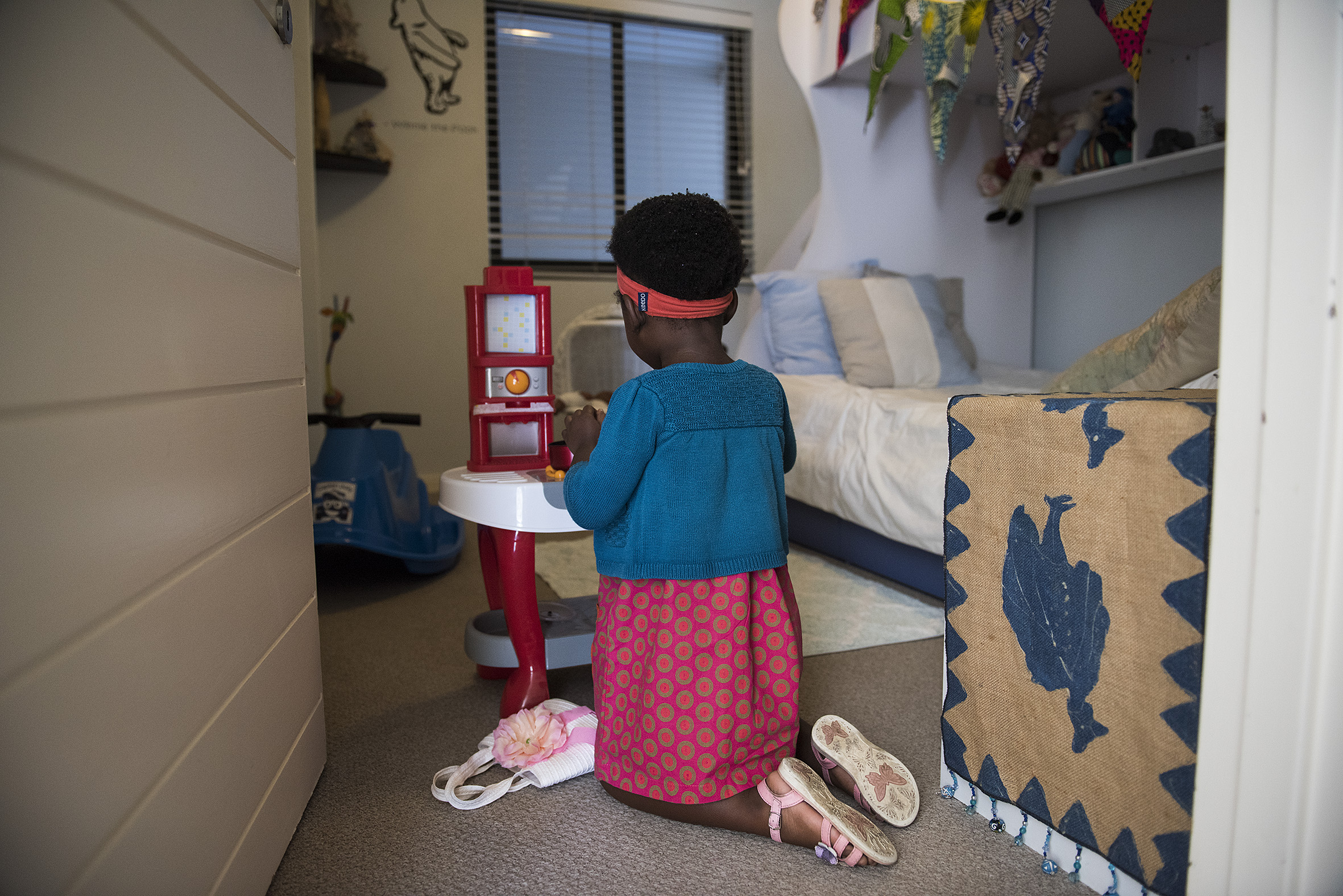“Mbali is the best thing that has ever happened to us but....we’re always cognisant of the fact that she had biological mother who must have experienced incredible emotional trauma in giving her up".
Women wearing weekend heels and fake lashes teeter out of smoky nightclubs, arm in arm. Drunken partygoers in stovepipe pants skulk against walls, waiting for the cold of the night air to give them a second wind.
The smell of beer and sweat clings to the air. The streets in Sunnyside, Pretoria, are buzzing — just before midnight on a Saturday. It was about this time on an autumn evening in May 2015 that July Chitlango and his friend Thabiso decided to call it a night.
They left the buzz of the bars and clubs on foot, and drew into a quiet part of the city near home. But then Chitlango stopped abruptly. Frowning, he leaned forward and grabbed his friend’s arm. “Listen,” he breathed, eyes wide.
Thabiso, alarmed by his friend’s sudden change of tone, started looking around frantically. “Molato ke eng?” he asked. “What’s wrong?” “Ssssssh,” said Chitlango. “There it is again.” His eyes followed the sound to a nearby bush.
Next to it, on the ground, an old blanket lay wrapped around something. There was a slight movement inside. The two friends inched closer. Then they heard a baby crying.
Dee Blackie leans forward in her chair. “The head of adoptions at Jo’burg Child Welfare told me that a good week is two children, and a bad week is around four,” she says, quoting the opening lines of her master’s thesis.
“And this is just one child protection organisation. There always seems to be a baby being abandoned in Johannesburg.” As part of her research, Blackie, who is also a founding member of the National Adoption Coalition of South Africa (Nacsa), phoned all the major child welfare offices across the country to find out how many babies are abandoned nationally every year.
There are no official government statistics for this. Child Welfare South Africa estimated that more than 3500 children were abandoned at their offices alone in 2010. This figure is what prompted Blackie to do her master’s research on this topic, to try to understand this growing challenge.
In 2017, Nacsa surveyed 26 privately run child and youth care centres, constituting roughly 10% of such organisations in the country. The results revealed that anonymous abandonments had increased as a percentage of total abandonments. But the story behind the numbers is far more complex than mothers leaving infants at taxi ranks or discarding them in dustbins.
“The symptom is, yes, women end up having to neglect newborns or toddlers,” says doctor and advocate Tlaleng Mofokeng. “But the symptom is evidence of a range of systemic failures at all levels.”
Mofokeng is based in Johannesburg and has been a reproductive health doctor for 10 years.
“Why are women themselves neglected and still raising children on their own?” she asks. “The issues that are making women feel unprepared, unsupported and unable to raise a child remain.”
Abba Specialist Adoption and Social Services, a private adoption agency headed up by Nacsa chairperson Katinka Pieterse, conducts community training sessions aimed at addressing what Pieterse describes as “a blame thing”.
“The health and support workers view the mothers as irresponsible, sleeping around with many men, having no morals. But then in our training, we ask: ‘Does anybody plan this?’” she says. “We ask them why do they think this really happened,” Pieterse explains. “And eventually we find the answers that are supported by research. Lack of support, lack of family care — in other words, unsustainable communities and families.”
Birth control: Which one’s best for you?
[multimedia source=”http://bhekisisa.org/multimedia/2016-05-23-birth-control-which-ones-best-for-you”]
About two-thirds of all pregnancies in South Africa are unplanned, according to a 2017 study published in the South African Medical Journal. Unplanned pregnancies are particularly common among young women, the research points out.
Although there appears to be a slow increase in the use of contraceptives countrywide, 42% of South African women don’t use birth control, according to Statistics South Africa.
Men’s use of contraceptives doesn’t look any better: the Human Sciences Research Council data show that more than half (52.9%) of male participants said they had never used a condom. Condom use had decreased from 85.2% among young men aged between 15 and 24 in 2008 to 67.5% in 2012.
Contraceptives are available for free at public health clinics but are often unobtainable — numerous studies have shown that health workers frequently discriminate against young, unmarried women who ask for contraceptives.
“We just feel ashamed but we don’t challenge them,” said one adolescent, speaking of the nurses who give her contraceptives at her local clinic. She was participating in a qualitative research study published in the journal Reproductive Health Matters in 2006. “Sometimes you may challenge them and find that you use words which may hurt them, then next time you go there, you find they refuse to help you.”
But access to contraceptives to prevent unplanned pregnancies isn’t the only problem — so is a person’s ability to use them and stay on them as needed. “The power dynamics in a relationship where you are almost unable to negotiate for safe sex is common,” says Mofokeng. “Sometimes people say: ‘Well, you know, I’m buying the food in this house, I’m paying the rent here and I’ll have sex with you whenever I want.’”
South African women also fall prey to “reproductive coercion”, in that they “are almost forced to prove love and prove worth by falling pregnant and having kids”, Mofokeng says.
But some don’t use contraceptives simply because they don’t want to. “We need to acknowledge that people can choose not to be on contraceptives, though,” says Mofokeng. “And if they don’t want to, that’s also fine.”

Is a sick healthcare system failing women, leaving infants abandoned? (Paul Botes, Mail & Guardian)
In response to the spate of babies being abandoned, places such as Door of Hope have sprung up. In central Johannesburg’s Berea, an area with a high incidence of child abandonment, founder Cheryl Allen pioneered the “baby bin”. It’s literally a hole in the wall, a place where mothers can anonymously leave their babies.
“The idea was for mothers to put their children here in a safe environment instead of throwing them in dustbins,” Nadene Grabham, operations director at Door of Hope, explains.
The concept elicited some strong criticism from advocates in the child protection space. “There were people who tried to shut us down when we first started,” says Grabham, perched at a children’s picnic table in the garden of one of the organisation’s homes in southern Johannesburg. “Even now, some doctors will say to us that we are making it easy for women to abandon their babies.”
But of the almost 1 600 children the organisation has cared for in the past 19 years, only 95 have come to them through the “baby box”. “It’s not a lot,” says Grabham. “So people cannot say that the baby box encourages abandonment, because that’s absolute nonsense. It’s 12% [of the total].”
Established 19 years ago, Door of Hope was slightly ahead of a trend that is now well established in every state in the United States. In Germany, “ babyklappen” (baby hatches) have been legalised since 2000, and “foundling wheels” were instituted in Italy in 2006. But there is little research to show their effect.
There is no country in the world in which extensive empirical data about baby bins has been generated, a 2009 study in the journal Health Policy argues. “From the limited understanding we have of the motivational profile of an abandoning mother, it seems that fear of prosecution and a wish for anonymity were not at the forefront,” the authors note.
So, it would seem that something other than a desire not to get “caught up by the law” is causing this phenomenon. South Africa has very little research to guide it in how to deal with abandonment, says Blackie.
“We seem to be stuck between shock and denial in this country. We refuse to actually acknowledge it’s a problem and we refuse to engage with it. “I think the reason is: What does this actually say about our communities and our society as a whole if you find out the real numbers? It’s a huge indictment on us.”

For babies such as Mbali*, the blank spaces defining their identity are often filled in by whoever happens to be on the morning shift. (David Harrison, Mail & Guardian)
Back in Sunnyside, a tiny baby girl stared back at Chitlango, with nothing but a T-shirt and the dirty blanket to protect her from the biting cold. She had round cheeks, perfectly plump lips and inquisitive eyebrows.
With tears stinging his face, he frantically waved down a passing car. “Please, please, take us to the police station,” he gasped.
Within a few hours, the police delivered the baby to the Tshwane District Hospital. The social worker there named her Mbali, meaning flower. Her surname became Chitlango, after the man who found her. For babies such as Mbali, the blank spaces defining their identity are often filled in by whoever happens to be on the morning shift.
We know nothing about the woman who abandoned Mbali. But in the nine months between the time that her mother’s search for the familiar redness of menstruation went in vain, to the time that the baby uttered her first cry, she is likely to have wondered many, many times what she was going to do.
Research into the mental health consequences for women who abandon their babies is scarce and so is evidence with which to understand risk factors or motives for abandonment is scarce.
But the authors of the 2009 Health Policy article note that they are “almost certainly traumatised”.
“A lot of abandonments result from violence and rape,” says Nacsa’s Pieterse. Research has shown that pregnancies resulting from sexual assault are considerable.
[WATCH] What does the law say about rape?
[multimedia source=”http://bhekisisa.org/multimedia/2018-02-25-does-forced-oral-sex-count-as-rape”]
A 2002 study from the United States National Violence Against Women Survey found that the rate at which women fall pregnant after an incident of sexual assault is more than double that of a single act of consensual sex.
In South Africa, a 2007 study conducted by the Eastern Cape’s social development department found that 43.2% of teenage mothers had been “explicitly raped”.
“There’s definitely also the young person that comes from the rural areas to an urban area, not wanting to go home with a baby,” Pieterse says. “But we do also find older women who are in a desperate situation; they have four or five other children and they can’t afford to keep the child.”
It’s at this crucially vulnerable time between conception and the first few weeks after childbirth that Nacsa tries to reach out to women experiencing unwanted pregnancies. In 2015, Nacsa launched an extensive communication campaign aimed at women who were in the same position as Mbali’s mother.
“The whole idea was to approach this differently,” says Pieterse. “You usually see photos of this stomach and nothing else. The emphasis is on the fact that the woman is pregnant and not on her as a person. “Many don’t get counselling and opt for backstreet abortions.”
Looking for a safe abortion or contraception? Find your nearest state provider using our SizaMap and make sure to call ahead as availability changes frequently.
“A lot of women don’t know that abortion is legal in South Africa,” says Mofokeng. “That gap in knowledge is a form of systemic violence. Many think a backstreet abortion is the only option available.”
South Africa is one of the few African countries where abortions are legal and free as a method to end unwanted pregnancies. The country instituted one of the most progressive abortion laws in Africa in 1996.
Until the 12th week of a pregnancy, a woman can have a legal abortion for whatever reason she chooses. Abortions between the 13th and 20th week of a pregnancy are legal if the woman can argue it will affect her socioeconomic status.
In March 2017, Bhekisisa conducted a telephonic survey to establish how many government clinics and hospitals provide abortions. At the time, the number was 197.
But abortion-related stigma still prevents many people with unwanted pregnancies from using this service.
“Many would rather approach a faceless businessperson than face the stigma and shaming they will encounter at the clinic where abortions are offered legally,” says Mofokeng.
“Some nurses use the ultrasound; they say: ‘Do you see this?’” explains Eddie Mhlanga, Mpumalanga’s chief government specialist of obstetrics and gynaecology. “They say to the pregnant woman: ‘This is a little foot. Now, do you want to [get rid of this child]?’”
A 2017 study, conducted by Rhodes University’s Critical Studies in Sexualities and Reproduction research programme, confirms Mhlanga’s experiences.
Researchers audio-recorded 32 pre-abortion counselling sessions, and interviewed women about their experiences of waiting-room interactions. They found that “much of the talk in sessions undermined abortion as a possible choice”. “Both nurses and independent counsellors ascribed independent personhood to the fetus, referring to the fetus as the ‘baby’ … providing visual representation of the fetus’s development through photographs,” the study revealed.
The World Health Organisation says up to 13% of deaths among pregnant women are the result of unsafe abortions — and that most such abortions take place in Africa, Asia and Latin America.
In South Africa, there are no figures available on how many unsafe abortions are conducted a year, or how many people die because of unsafe abortions, because “illegal abortion” is not a category on the death certificates completed by doctors when women die.
“Often, women don’t realise that they are pregnant until they start feeling the baby move,” Blackie says.
“At that stage, she sees a poster advertising ‘safe, quick abortions’. She goes along to the so-called doctor [who is not a medical professional and is operating illegally], who gives her tablets to drink.
He tells her: ‘Drink these tablets and you’ll have a heavy period and it will all go away.’ And that might happen in the early weeks of pregnancy, but at five or six months it brings on contractions and sends her into early labour.”
Watch: How easy is it to end an unwanted pregnancy? Not very. Listen to what health workers told us as we conducted research to put together South Africa’s first map of safe abortions, SizaMap.
The social development department favours “reunification” of the abandoned baby with a family member. In the absence of that, child protection officers aim to facilitate a permanent adoption.
But in South Africa, where the United Nations Children’s Fund estimates there are 3.7‑million orphans and 190 000 children in shelters, the adoption rates are low. In 2013, only 1 699 adoptions took place in the entire country, down from 2 840 a decade prior.
Blackie’s findings indicate that deep-seated beliefs in South Africa inadvertently favour abandonment over abortion and adoption. “Abandonment is not seen as permanent, whereas adoption is permanent — when you abort a child or put it up for adoption, it is seen as problematic,” says Blackie.
Families and healthcare workers often condemn women who want to put their babies up for adoption, not wanting to be “guilty by association”, she explains.
As recorded in her research, a social worker said: “We have had so many cases where women are treated badly by nurses for wanting to voluntarily give their child up for adoption. They punish them; sometimes they don’t give them pain medication after they have had a C-section.”
Michelle Barrows, who has worked as a midwife and neonatal intensive care unit nurse at various facilities around the country, describes similar experiences.
“I remember, once, a mother who was about 17 years old. She wanted to put her child up for adoption but she wasn’t yet sure.”
“Eventually she decided to come to the ICU nursery to see the baby and hold the baby and decide. When she came into the ward, another nursing sister met her at the door, and she turned around and shouted into the nursery: ‘This is the woman who wants to just throw away her baby!’ There were other mothers in there who said: ‘How can you do that?’
“She was just devastated. I think for the rest of her life that will stay with her, do you know what I mean?” says Barrows. “I think she ended up taking that child home, and I don’t think she wanted to.”

Mbali* was found as an infant wrapped in a blanket in a bush. The first surname she ever had was that of the man who found her and saved her life, “Chitlango”. (David Harrison, Mail & Guardian)
Baby Mbali is now three years old. She ended up in a children’s home in Pretoria where she was adopted when she was three months old.
The toddler lives with her adoptive parents in Cape Town. She loves playing outside and has an infectious laugh.
“Mbali is the best thing that has ever happened to us,” says her adoptive mother, who prefers not to be named. “She has made our family and our lives complete. Every day with her is a new joy.
“But we’re always cognisant of the fact that she has a first family that she will probably never know, and a biological mother who must have experienced incredible emotional trauma in giving her up.”